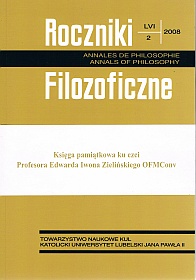O uzasadnieniach przekonań religijnych
Abstrakt
Belief is a mental state, its content being the statement of a certain state of affairs. With respect to the manner they arise, we divide beliefs into spontaneous and reflexive. When we take into consideration their bases, we speak about basic beliefs and beliefs derived from others. The terms “spontaneous belief” and “basic belief” have various meanings, but they are equivalent with regard to their range.
Contemporary religious spontaneous and basic beliefs have various forms. In the Christian religion we speak, among other things, about numinous beliefs, as described by R. Otto, and A. Plantinga’s properly basic beliefs. According to Otto, numinous experiences (of that which is tremendum et fascinans) are a source of firm beliefs for man, i.e. he has had contacts with some objective manifestations of divinity. Plantinga (whose thinking belongs to a more “naturalistic” strain) writes about properly basic beliefs, such that arise spontaneously in man (if he is not depraved by sinful life) who remains under respective circumstances. Such beliefs are the grounds for theistic derivative beliefs. The arguments for the truthfulness of the beliefs of the first and second type bring forth a series of questions, and they are constantly discussed by philosophers of religion.
Bibliografia
Almond P. C.: Rudolf Otto: An Introduction to His Philosophical Theology, Chapel Hill, Nord Carolina 1984.
Alston W.: Christian Experience and Christian Belief, [w:] Faith an Rationality, ed. A. Plantinga and N. Wolterstorff, Notre Dame, Ind. 1983.
Baker L. R.: Saving Belief, New York 1987.
Blanshard B.: Reason and Belief, London 1974.
Chisholm R. M.: The First Person; an Essay on Reference an Intentionality, Minneapolis 1981.
Chwedeńczuk B.: Przekonania religijne, Warszawa 2000.
Clifford W.: The Ethics of Belief, [w:] Ethics of Belief Debate, ed. G. D. McCarthy, Atlanta 1986.
Gutting G.: Religious Belief and Religious Skepticism, Notre Dame. Ind. 1982.
Knowledge and Belief, red. A. Ph. Griffiths, Oxford 1967.
Koj L.: Myślenie i przekonanie, [w:] Myśl i znak, Białystok 1990.
Koj L.: O zasadności przekonań, [w:] Fragmenty filozoficzne ofiarowane Henrykowi Hiżowi, Warszawa 1992, s. 49-60.
Otto R.: Das Heilige, München 1917 (Wyd. 38. – w 1963). Przekład polski: Świętość, Warszawa 1993.
Paśniczek J.: Meinongowska wersja logiki klasycznej, Lublin 1988.
Plantinga A.: Is Belief in God Rational?, [w:] Rationality and Religious Belief, ed. C. F. Delaney, Notre Dame, Ind. 1979.
Plantinga A.: Is Belief in God Properly Basic?, „Nous” 15 (1981), s. 41-51.
Plantinga A.: Reason and Belief in God: Faith and Rationality, ed. A. Plantinga and N. Wolterstorff, Notre Dame, Ind. 1983.
Plantinga A.: Warranted Christian Belief, New York 1998.
Scientific and Religious Belief, red. P. Weingarten, Dortrecht 1994.
Wainwright W. J.: Philosophy of Religion, Belmont, California 1988.
Woleński J.: Granice niewiary, Kraków 2004.
Yandell K. E.: Basis Ussues in Philosophy of Religion, Boston 1971.
Copyright (c) 2008 Roczniki Filozoficzne

Utwór dostępny jest na licencji Creative Commons Uznanie autorstwa – Użycie niekomercyjne – Bez utworów zależnych 4.0 Międzynarodowe.





